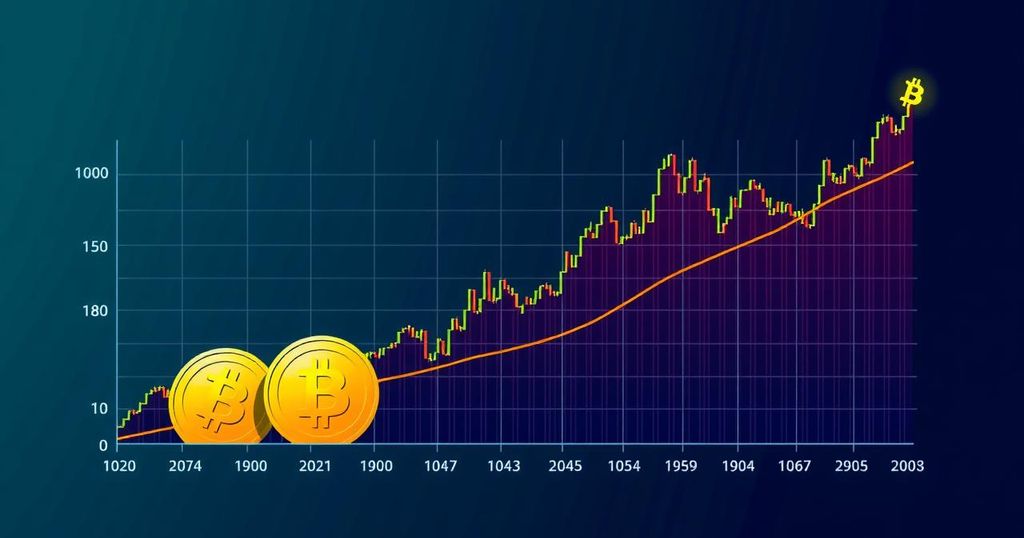Natalie Brunell Advocates for U.S. Bitcoin Strategic Reserve Proposal
Natalie Brunell discussed Senator Cynthia Lummis’s proposal to convert part of U.S. gold reserves into Bitcoin, aiming to acquire one million Bitcoins over 20 years. She highlighted Bitcoin’s significant growth rate, its role in protecting against economic turmoil, and its adoption by corporations. The proposal could enhance Bitcoin’s market value and influence its role in democratizing financial systems, despite challenges like regulatory hurdles and volatility.
In a recent discussion with Kitco News, Natalie Brunell, a prominent Bitcoin educator and host of the Coin Stories podcast, elaborated on the innovative proposal put forth by U.S. Senator Cynthia Lummis regarding the establishment of a Bitcoin Strategic Reserve for the United States. Brunell explained that Lummis wishes to utilize part of the nation’s considerable gold reserves, which exceed 8,000 tons, to acquire Bitcoin. This strategy aims to secure one million Bitcoins over a span of 20 years, which would represent approximately 5% of Bitcoin’s total supply. Brunell emphasized that such a transition could be executed in a manner that is “balance sheet neutral” by converting gold certificates to Bitcoin instead of purchasing the cryptocurrency outright with cash.
Brunell remarked that the implementation of this proposal could commence swiftly, potentially within the first 100 days of a prospective Trump administration. She asserted that this move would not only underscore the United States’ leadership in the Bitcoin space but might also encourage other nations to adopt similar strategies. By referencing Michael Saylor’s philosophy of “selling the past to buy the future,” Brunell highlighted Bitcoin’s superiority as a modern asset in comparison to gold.
Furthermore, Brunell connected the proposal for a Bitcoin Reserve to the overarching economic challenges currently facing the United States, notably rising deficits and inflation. She contended that Bitcoin acts as a safeguard against currency debasement, a significant concern as governments globally continue to generate currency to manage their increasing debts. She underscored Bitcoin’s finite supply and decentralized characteristics as ideal attributes making it a protective measure against economic pressures.
Importantly, Brunell noted that Bitcoin has demonstrated exceptional growth over the long term, boasting a compound annual growth rate of approximately 40%. She argued that Bitcoin is increasingly recognized as a valuable asset for individuals, corporations, and governments seeking to preserve their wealth in today’s economically uncertain environment. Brunell cited MicroStrategy’s acquisition of nearly 52,000 Bitcoins as a key example of how businesses are adopting Bitcoin to bolster their financial standing.
As the discussion progressed, Brunell elaborated on the potential effects of a U.S. Bitcoin Reserve on market dynamics, stating that acquiring such a significant amount of Bitcoin over the next two decades would likely propel Bitcoin’s value upward, attracting institutional and governmental interest. She noted Bitcoin’s technological advancements that rectify many of gold’s limitations, including its physical nature and settlement challenges.
Brunell articulated the role of Bitcoin in democratizing financial systems, suggesting that it offers a viable solution for individuals who feel marginalized by conventional monetary policies. Bitcoin represents an opportunity to engage in a global financial framework immune to manipulation or inflation.
While expressing optimism about the future of Bitcoin under a supportive regulatory environment, Brunell acknowledged the existing challenges, such as navigating SEC regulations and the necessity for bipartisan support. Additionally, she raised concerns about Bitcoin’s volatility, which may dissuade potential new adopters from investing.
Bitcoin, often referred to as digital gold, has garnered significant attention as a revolutionary financial asset offering protection against economic instability. Amidst concerns about inflation and currency debasement due to excessive money printing, Bitcoin is perceived as a viable hedge. The proposal to establish a Bitcoin Strategic Reserve could set a precedent for government-level adoption of cryptocurrencies, highlighting the potential for institutional investment and the future of monetary policies influenced by decentralized finance.
In conclusion, Natalie Brunell’s insights shed light on a transformative proposal by U.S. Senator Cynthia Lummis to create a Bitcoin Strategic Reserve, advocating for the conversion of gold reserves into Bitcoin to enhance economic stability. The proposal carries profound implications for the acceptance and integration of Bitcoin at institutional and governmental levels. As Bitcoin continues to outperform traditional assets, its potential to serve as a safeguard against economic uncertainty positions it as an asset of paramount importance in contemporary finance.
Original Source: www.cryptoglobe.com








Post Comment